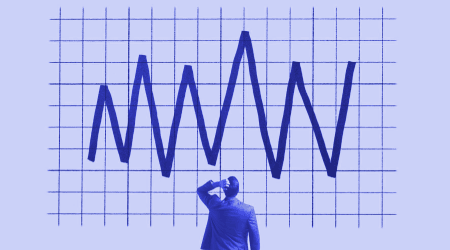5 cognitive biases that short-change traders and investors

Know thyself – and learn how your psychology can impact your trading
 Sponsored by IG Australia Pty Ltd (AFSL 515106). Ambitious and ready to improve your trading mind? Explore expert articles, insights and podcasts at IG's free Master Your Trading Mind learning hub. Because our brains aren't naturally wired for trading, but they can be rewired and we can learn and evolve. And IG is Where Traders Are Made.
Sponsored by IG Australia Pty Ltd (AFSL 515106). Ambitious and ready to improve your trading mind? Explore expert articles, insights and podcasts at IG's free Master Your Trading Mind learning hub. Because our brains aren't naturally wired for trading, but they can be rewired and we can learn and evolve. And IG is Where Traders Are Made.
Sponsored by IG Australia Pty Ltd (AFSL 515106). Ambitious and ready to improve your trading mind? Explore expert articles, psychology insights and podcasts at IG's free Master Your Trading Mind learning hub. Because our brains aren't naturally wired for trading, but they can be rewired and we can learn and evolve. And IG is Where Traders Are Made.
All of us have known traders and investors – or perhaps been one ourselves – who consistently behave in an irrational manner and make questionable decisions. In rare cases it might lead to reward, but it's unlikely and if anything it's more likely to cause the trader issues.
So what's the underlying problem? Well, these people may be affected by cognitive biases.
What are cognitive biases?
Broadly, a cognitive bias is a repeated, ongoing deviation from what we would generally consider "rational behaviour".
The behaviour often (though not always) goes unnoticed by the protagonist. To them, it's just "normal", even if it's having ongoing negative consequences for them.
Now, this is different from one-off occurrences of unusual behaviour – we all make mistakes from time to time and learn not to repeat them or slip into magical thinking.
The exact causes of cognitive biases are uncertain, but associative memory and evolution are both believed to have played a role.
Now you might be thinking you suffer from cognitive bias. After all, a lot of us are walking around with a range of them without even paying attention to it.
There is good news, though – as Tony Sycamore, IG Australia Market Analyst notes, having a bias in the initial instance isn't necessarily a bad thing, because it's often the factor which tips a trader to open a position.
"Where a bias becomes a problem is when the trader clings to their view even though the market or price action is not doing as expected which suggests the bias is probably wrong," says Sycamore.
Let's take a look at some common cognitive biases, and how you can work to avoid them.
1. Confirmation bias
Humans have a tendency to interpret new information according to their pre-existing beliefs. This is called "confirmation bias" – and it's a shining example of why facts frequently don't actually change minds.
The obvious concern for traders is blowing up your portfolio over an ill-informed decision. But there's also the potential for hindering your growth as an investor due to self-limiting behaviours.
How to avoid confirmation bias
"Your results can often show you when you're on the wrong path," says Louise Bedford, trading psychology specialist and advisor for IG's Master Your Trading Mind Hub – a collection of resources aimed at helping traders master their trading psychology.
"'If'/ 'then' statements work really well for behaviour modification. For example, you can put a statement like this into your trading plan - "If I lose 25% of my capital, then I will stop entering new positions, and allow the ones I'm in to run until they hit their stop. I will contact my trading mentor for advice"."
IG Guide: The six biases that can influence traders
2. Loss aversion
For many people, the pain they experience losing something they own vastly outweighs the pleasure they feel in gaining something new.
This is called "loss aversion".
Risk is inherent in trading, and avoiding the potential for loss entirely can mean that you never really hit the highs you may be capable of.
How to avoid loss aversion
A certain degree of detachment is necessary for you make better decisions around your investments.
"Even for professional traders it's normal to be happy about a winning trade or cranky over a losing trade – it is the nature of the game," says Sycamore.
"The key is trying to minimise the swings, stay in the zone and follow the process. Know that there will be both good days and bad days in trading. The desired outcome is to have more good days than bad days and to build the account balance."
3. Anchoring
"Anchoring" occurs when you assign the most value to the first piece of information that you receive about a particular topic.
Even if you subsequently hear information that leads to a radically different conclusion, there's still a tendency to interpret it in light of the first piece of information – the "anchor".
How to avoid anchoring bias
Although it's good to be aware of it in the moment, these decisions are sometimes easiest to recognise in hindsight. Accordingly, Bedford advises that you look for flaws in your process.
"Look at your past trades – try to understand why you made the decisions you did as a trader, and aim to isolate areas where you could have acted irrationally," says Bedford. "Set this up as a once-a-year review in your calendar."
You can listen to an episode of IG's Trading Psychology podcast series right here. The full series is available on the Master Your Trading Mind Hub.
4. The Sunk-Cost Effect
The sunk-cost effect – or fallacy – is when someone sticks with a particular course of action because they've already sunk a great deal of time and/or money into it.
Now the good news is that most of the time, the stakes for the sunk-cost effect are pretty low. An album or book you forced your way through wasn't any good? That's irritating, but it's not the end of the world.
But when it comes to trading, it's more of a problem. This is why having a plan before you invest is essential.
How to avoid the sunk-cost effect
"Determine where you will get out of a trade either for a profit or loss before the trade is entered. Take the emotion out because once emotion is involved, your edge and ability to have control over the outcome is gone," Sycamore continues.
5. Bandwagon effect
Chasing trends – or getting on the bandwagon – is a challenge for even the most experienced traders. No-one wants to miss out on a potential windfall.
But just because everyone's chasing after something doesn't necessarily mean it's worth your time.
How to avoid the bandwagon effect
Avoiding the bandwagon effect is a multi-faceted consideration. You should be able to do your own research, which will help you determine whether an opportunity is something of merit or simply traders getting too excited about a passing trend.
Additionally, you should always check new opportunities against your own trading plan. This way, if you do decide to run with a new opportunity, you'll be able to have more confidence in your trades, rather than moving into totally new territory.

These five cognitive biases are just a few of the many that can affect traders. However, resources like the Master Your Trading Mind Hub are available to assist traders to identify and combat potential issues.
By being prepared, you may be able to help reduce the effects of cognitive bias on your future trades.
Start trading with IG
Compare other CFD trading platforms here

